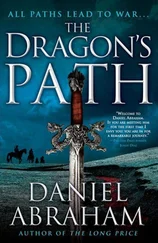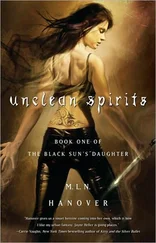Daniel Abraham - THE
Здесь есть возможность читать онлайн «Daniel Abraham - THE» весь текст электронной книги совершенно бесплатно (целиком полную версию без сокращений). В некоторых случаях можно слушать аудио, скачать через торрент в формате fb2 и присутствует краткое содержание. Жанр: Фэнтези, на английском языке. Описание произведения, (предисловие) а так же отзывы посетителей доступны на портале библиотеки ЛибКат.
- Название:THE
- Автор:
- Жанр:
- Год:неизвестен
- ISBN:нет данных
- Рейтинг книги:3 / 5. Голосов: 1
-
Избранное:Добавить в избранное
- Отзывы:
-
Ваша оценка:
- 60
- 1
- 2
- 3
- 4
- 5
THE: краткое содержание, описание и аннотация
Предлагаем к чтению аннотацию, описание, краткое содержание или предисловие (зависит от того, что написал сам автор книги «THE»). Если вы не нашли необходимую информацию о книге — напишите в комментариях, мы постараемся отыскать её.
THE — читать онлайн бесплатно полную книгу (весь текст) целиком
Ниже представлен текст книги, разбитый по страницам. Система сохранения места последней прочитанной страницы, позволяет с удобством читать онлайн бесплатно книгу «THE», без необходимости каждый раз заново искать на чём Вы остановились. Поставьте закладку, и сможете в любой момент перейти на страницу, на которой закончили чтение.
Интервал:
Закладка:
Machi began. She spoke with the chalky tones of a woman still in pain.
If Maati had held hopes that his once-lover might take him in, they did
not survive that conversation. He left her house in agony. He had not
spoken to her since.
Two years after that, he took his first student, a woman named Halit.
Since then, his life had become a narrow, focused thing. He had remade
himself as a teacher, as an agent of hope, as the Dai-kvo of a new age.
It was less glamorous than it sounded.
All that morning he had lain in the small room that was presently his
home, squinting at the dirty light that made its way through the
oiledparchment window and thinking of the andat. Thinking of thoughts
made flesh, of ideas given human form and volition. Little gods, held
tight to existence by the poets who knew them best and, by knowing,
bound them. Removing-the-Part-That-Continues, called Seedless.
WaterMoving-Down, called Rain or Seaward. Stone-Made-Soft who had no
other name. And his own-Corrupting-the-Generative, called Sterile, whom
Maati had not quite bound, and who had remade the world.
The lessons he had learned as a boy, the conversations he had had as a
man and a poet, they all came back to him dimly. Fragments and moments,
insights but not all the steps that had led him there. A mosquito whined
in the gloom, and Maati waved it away.
Teaching his girls was like telling the story of his life and finding
there were holes in it. He knew things-structures of grammar and
metaphor, anecdotes of long-dead poets and the bindings they had made,
occult relationships between abstractions like shapes and numbers and
the concrete things of the world-without remembering how he'd learned
them. Every lecture he gave, he had to half-invent. Every question he
answered, he had to solve in his mind to be sure. On one hand, it was as
awkward as using a grand palace as a lesson on how to build scaffolding.
And on the other, it was making him a better poet and a better teacher
than he would ever have been otherwise.
He sat up, the canvas cot groaning as his weight shifted. The room was
tiny and quiet; the stone walls wept and smelled of fungus. Halfaware of
his surroundings and half in the fine points of ancient grammars, Maati
rose and trundled up the short flight of stairs. The warehouse stood
empty, the muted daylight and the sound of light rain making their way
through the high, narrow windows. His footsteps echoed as he crossed to
the makeshift lecture hall.
Benches of old, splintering wood squatted near a length of wall smooth
enough to take chalk. The markings of the previous evening still shone
white against the stone. Maati squinted at them.
Age was a thief. It took his wind, it made his heart race at odd times,
and it stole his sleep. But the worst of all the little indignities was
his sight. He hadn't thought about the blessing that decent vision was
until his eyes started to fail. It made his head ache a bit, but he
found the diagram he'd been thinking of, traced it with his fingertips,
considered, and then took a rag from the pail of water beside his little
podium and washed the marks away. He could start there tonight, with the
four categories of being and their relationships. It was a subtle point,
but without it, the girls would never build a decent binding.
There were five of them now: Irit, Ashti Beg, Vanjit, Small Kae, and
Large Kae. Half a year ago, there had been seven, but Umnit had tried
her binding, failed, and perished. Lisat had given up and left him. Just
as well, really. Lisat had been a good-hearted girl, but slow-witted as
a cow. And so, five. Or six, if he counted Eiah.
Eiah had been a gift from the gods. She spent her days in the palaces of
Utani, playing the daughter of Empire. He knew it was a life she
disliked, but she saw to it that food and money found their way to
Maati. And being part of the court let her keep an ear out for gossip
that would serve them, like a dispute over the ownership of a low-town
warehouse that left both claimants barred from visiting the building
until judgment was passed. The warehouse had been Maati's for two months
now. It was beginning to feel like his own. He dropped the rag back into
its pail, found the thick cube of chalk, and started drawing the charts
for the evening's lecture. He wondered whether Eiah would be able to
join them. She was a good student, when she could slip away from her
life at the palace. She asked good questions.
The crude iron bolt turned with a sound like a dropped hammer, and the
small, human-size door beside the great sliding walls intended for carts
and wagons opened. A woman's figure was silhouetted against the soft
gray light. It was neither of the Kaes, but his eyes weren't strong
enough to make out features. When she came in, closing the door behind
her, he recognized Vanjit by her gait.
"You're early, Vanjit-cha," Maati said, turning back to the wall and chalk.
"I thought I might be able to help," she said. "Are you well, Maaticha?"
Vanjit had been with him for almost a year now. She had come to his
covert school, as all the others had, through a series of happy
accidents. Another of his students-Umnit-had fallen into conversation
with her, and something had sparked between them. Umnit had presented
Vanjit as a candidate to join in their work. Reluctantly, Maati had
accepted her.
The girl had a brilliant mind, no question. But she had been a child in
Udun, the only one of her family to survive when the Galts had come, and
the memory of that slaughter still touched her eyes from time to time.
She might laugh and talk and make music, but she bore scars on her body
and in her mind. In the months he had spent working with her, Maati had
come to realize what had first unnerved him about the girl: of all the
students he had taught, she was most like him.
He had lost his family in the war as well-his almost-son Nayiit, his
lover Liat, and the man he had once thought his dearest friend. Otah,
Emperor of the Khaiem. Otah, favored of the gods, who couldn't fall down
without landing on rose petals. They had not all died, but they were all
lost to him.
"Maati-cha?" Vanjit said. "Did I say something wrong?"
Maati blinked and took a pose of query.
"You looked angry," she said.
"Nothing," Maati said, shifting the chalk to his other hand and shaking
the ache from his fingers. "Nothing, Vanjit-kya, my mind was just
wandering. Come, sit. There's nothing that you need to do, but you can
keep me company while I get ready."
She sat on the bench, one leg tucked under her. He noticed that her hair
and robe were wet from the rain. There was mud on her boots. She'd been
walking out in the weather. Maati hesitated, chalk halfway back to the
stone.
"Or," he said slowly, "perhaps I should ask if you've been well?"
She smiled and took a pose that dismissed his concerns.
"Bad dream again," she said. "That's all."
"About the baby," Maati said.
"I could feel him inside of me," she said. "I could feel his heartbeat.
It's strange. I hate dreaming about him. The nightmares that I'm back in
the war-I may scream myself awake, but at least I'm pleased that the
dream's ended. When I dream about him, I'm happy. I'm at peace. And then
..."
She gestured at the childless world around them.
"It's worse, wishing I could sleep and dream and never awake."
Читать дальшеИнтервал:
Закладка:
Похожие книги на «THE»
Представляем Вашему вниманию похожие книги на «THE» списком для выбора. Мы отобрали схожую по названию и смыслу литературу в надежде предоставить читателям больше вариантов отыскать новые, интересные, ещё непрочитанные произведения.
Обсуждение, отзывы о книге «THE» и просто собственные мнения читателей. Оставьте ваши комментарии, напишите, что Вы думаете о произведении, его смысле или главных героях. Укажите что конкретно понравилось, а что нет, и почему Вы так считаете.










